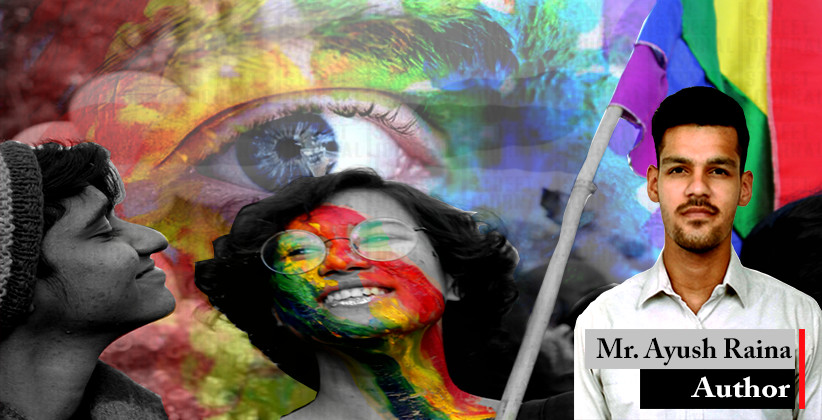The Transgender Persons (Protection of Rights) Bill, 2019 has been passed in Rajya Sabha on November 26, 2019 during the winter session of the Parliament. The bill was passed on August 5, 2019 in the Lok Sabha during the monsoon session of the Parliament and was coincided with the abrogation of Article 370 in the state of Jammu and Kashmir. The Bill received assent from President Ram Nath Kovind on December 5, 2019 and was made into a law.
The Transgender Persons (Protection of Rights) Act, 2019 seeks to provide a framework to empower Transgender persons in social, economic and educational fields and is also intended to benefit the Transgender Community.
The Supreme Court of India had directed in National Legal Services Authority v. Union of India and OthersAIR 2014 SC 1863that the transgender community must be recognised as a third gender along with male and female and it has also been directed by the court that both the Centre and State Governments should frame such schemes for the welfare of the transgender community i.e. taking measures to provide medical care facilities and reservations.
HIGHLIGHTS OF THE ACT
- Identification: An application be made by a transgender person to the District Magistrate for issuing a certificate of identity as a transgender person. The law states that a transgender person will have a right to self-perceived gender identity.
- Definition of Transgender Person: The Act gives a definition of transgender person as a person whose gender does not match with the gender assigned to that person at birth and includes trans-man or trans-woman (whether or not such person has undergone Sex Reassignment Surgery or hormone therapy or laser therapy or such other therapy), person with intersex variations, genderqueer and person having such socio-cultural identities as Kinner, hijra, aravani and jogta.
- Prohibition against Discrimination: The Act protects the transgender person against discrimination. A statutory ban on discrimination against a transgender person now exists. The Act prohibits discrimination against a transgender person, including denial of service or unfair treatment concerning:
- Education.
- Employment or occupation.
- Medical healthcare.
- Right to purchase, reside, rent or occupy any property.
- Right to movement.
- Opportunities to work in public or private office.
- Access to enjoyment of good, facilities and other opportunities that are available to the public.
- Access to Government as well as private establishment.
- National Council for Transgender Persons: The Act also provides that the Central Government shall establish a National Council for Transgender Persons to advice, monitor, evaluate and review the policies and programmes for transgender persons. The other function of National Council for Transgender Persons is to redress the grievances of transgender persons.
CRITICISM AGAINST THE ACT
The Act has serious flaws because of the inherent lack of understanding of gender.
- All the rights given to the transgender persons under the Act are already guaranteed under Article 14 of the Constitution of India.
- The certification of transgender persons can segregate transgender persons from society and the issuance of a certificate may violate the right to privacy guaranteed under Article 21 of the Constitution of India.
- The definition of a trans-person or a transgender person is not defined properly and is somehow mixed with that of an intersex person. Transgender persons have a different gender identity than what was given to them at birth, while intersex indicates a diversity of gender-based on biological characteristics.
- This Act uses the term non-discriminatory very liberally but the definition of discrimination or the nature of discrimination is not given. Having said so, no penalty has been prescribed for a person who discriminates against a transgender person.
- If the transgender person is denied the certificate by the District Magistrate, he does not need to mention the reason for refusal, as well as the Act, remained silent about the procedure in case the District Magistrate refuses to recognize a transgender or to issue a certificate. There are various questions unanswered as to whether a transgender person can appeal the refusal of a certificate.
- The judgment forced the government to recognize the transgender person group as socially and educationally backward groups and to extend quotas for admission to educational institutions and public appointments. The Act is also silent on this issue.
- If a transgender person is sexually abused, assaulted or harassed, the maximum punishment is just two years when a higher form of punishment is available for the same offence against male or female.
SUGGESTIONS & CONCLUSIONS
The Act is supposed to be the result of the judgment of the Supreme Court in the 2014 NALSA case, mandating the central and state governments to ensure legal recognition of all transgender persons and effective steps for their welfare, but it has left more questions unanswered than the concerns it aims to addresses. The Transgender Persons (Protection of Rights) Act, 2019 covers all but the Community's rights. The judgment specifically states that gender self-determination is an intrinsic part of personal liberty and falls within the scope of personal freedom guaranteed by the Indian Constitution. A select committee should be formed and the Act should be revised. A select committee will scrutinize the Act again and can suggest various amendments required. In view of the issues and other essential flaws mentioned above, the Act requires reconsideration in its current form as the Act may not be of much help to the transgender community in its present form.
About the Author: Ayush Raina is a final year law student from the Maharaja Sayajirao University of Baroda, Gujarat.
Mr. Raina has previously worked as an intern in various law firms. His areas of interest include Constitutional law and Criminal law.









